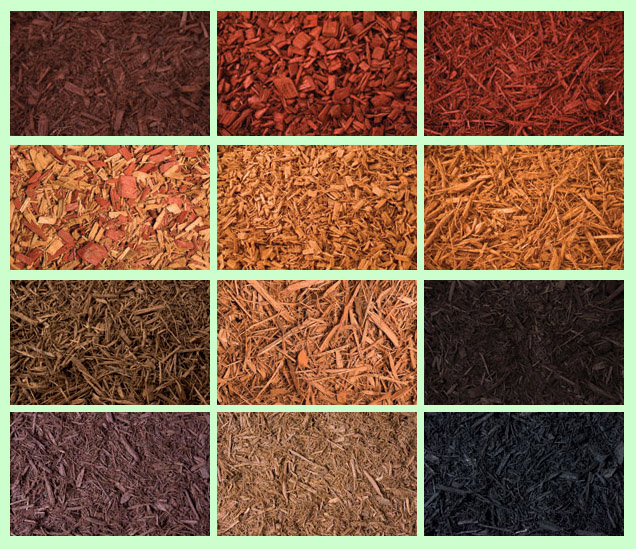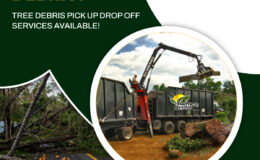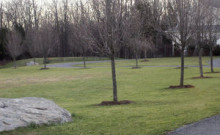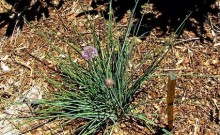The buzz word today is sustainability, meaning we want products that endure, yet are recyclable and socially responsible. From raw materials to the disposal of trash, we want what is least harmful to the environment.
And that can include lawn and garden devices and merchandise.
A Fort Myers firm is offering a sustainable mulch that lasts for years, requires fewer chips and is made from invasive trees mostly in southwest Florida.
Allied Prefer’s Mulch-Less is a wood chip hardened to mirror the feel and characteristics of a petrification. The chips are heavier, meaning fewer are required, they won’t fade, float off in storms or decompose, Allied’s general manager Patrick Hesser said. The chips are of Australian pine or the obnoxious melaleuca, which the city of Cape Coral has worked to weed from the community’s inventory of trees and shrubs.
Mineralization of wood chips in the manufacturing includes recycling of the liquids and dyes used in the process, Hesser said.
“There is absolutely no waste (here),” he said. “From Tampa to Naples, we’re seeing growing demand for the product.”
The product has also brought a few jobs to the region. Allied Prefer in Fort Myers has added eight office and shop workers at an 18,000-square-foot facility in Fort Myers, for instance. Hesser said increasing sales will mean expanded jobs. The firm is owned by Naples businessman Gary Wasserman.
Mulch-Less is the byproduct of a European mandate to slow fossil fuel use and limit greenhouses gases. A Belgian firm developed an aggregate of natural materials to be used in construction. The byproduct is a landscape chip impervious to decay. Dyes are vegetable based and recyclable.
Sustainability is gaining traction with world consumers. More than half polled in a 2014 Nielsen survey said they would pay more for products and services offered by firms with a commitment to positive social and environmental impact. Surprisingly, Europe and the U.S. lag other world regions in buying products branded as socially responsible.
But the numbers are shifting, and quickly.
Four in 10 respondents in North America and Europe say they have made a sustainable purchase in the past six months, according to Nielsen. Some 52 percent of global respondents in Nielsen’s survey say their purchase decisions are partly dependent on the packaging – they check the labeling first before buying to ensure the brand is committed to positive social and environmental impact.
Sustainability for the time also means more at the cash register.
Forty pounds of Mulch-Less is nearly $7, or about double standard chips. But they endure Florida heat, bugs and moisture, meaning more bang for the buck, said Jim Guelcher, a Cape resident with a small landscape island in his front yard covered in brick red Mulch-Less chips.
Regular wood chips, he said, “end up like a compost, and turns to bugs. And because (Mulch-Less) is inert, it won’t damage the environment. I was impressed.”
– See more at: http://www.cape-coral-daily-breeze.com/page/content.detail/id/544612/Consumers-shifting-to-sustainable-products.html?nav=5004#sthash.dzWevi1Q.dpuf
The buzz word today is sustainability, meaning we want products that endure, yet are recyclable and socially responsible. From raw materials to the disposal of trash, we want what is least harmful to the environment.
And that can include lawn and garden devices and merchandise.
A Fort Myers firm is offering a sustainable mulch that lasts for years, requires fewer chips and is made from invasive trees mostly in southwest Florida.
Allied Prefer’s Mulch-Less is a wood chip hardened to mirror the feel and characteristics of a petrification. The chips are heavier, meaning fewer are required, they won’t fade, float off in storms or decompose, Allied’s general manager Patrick Hesser said. The chips are of Australian pine or the obnoxious melaleuca, which the city of Cape Coral has worked to weed from the community’s inventory of trees and shrubs.
Mineralization of wood chips in the manufacturing includes recycling of the liquids and dyes used in the process, Hesser said.
“There is absolutely no waste (here),” he said. “From Tampa to Naples, we’re seeing growing demand for the product.”
The product has also brought a few jobs to the region. Allied Prefer in Fort Myers has added eight office and shop workers at an 18,000-square-foot facility in Fort Myers, for instance. Hesser said increasing sales will mean expanded jobs. The firm is owned by Naples businessman Gary Wasserman.
Mulch-Less is the byproduct of a European mandate to slow fossil fuel use and limit greenhouses gases. A Belgian firm developed an aggregate of natural materials to be used in construction. The byproduct is a landscape chip impervious to decay. Dyes are vegetable based and recyclable.
Sustainability is gaining traction with world consumers. More than half polled in a 2014 Nielsen survey said they would pay more for products and services offered by firms with a commitment to positive social and environmental impact. Surprisingly, Europe and the U.S. lag other world regions in buying products branded as socially responsible.
But the numbers are shifting, and quickly.
Four in 10 respondents in North America and Europe say they have made a sustainable purchase in the past six months, according to Nielsen. Some 52 percent of global respondents in Nielsen’s survey say their purchase decisions are partly dependent on the packaging – they check the labeling first before buying to ensure the brand is committed to positive social and environmental impact.
Sustainability for the time also means more at the cash register.
Forty pounds of Mulch-Less is nearly $7, or about double standard chips. But they endure Florida heat, bugs and moisture, meaning more bang for the buck, said Jim Guelcher, a Cape resident with a small landscape island in his front yard covered in brick red Mulch-Less chips.
Regular wood chips, he said, “end up like a compost, and turns to bugs. And because (Mulch-Less) is inert, it won’t damage the environment. I was impressed.”







Leave a Comment
You must be logged in to post a comment.